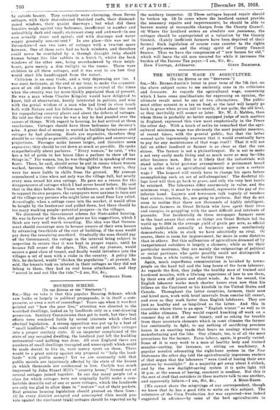HOUSING SCHEME.
(To THE EDITOR OF THE "SPECTATOR."] Sia,—May we take it that this popular Housing Scheme, which now bulks so largely in political propaganda, is in itself a com- promise, or even a sort of camouflage? Years ago when it was first pointed out "how the poor live," attention was directed to the wretched dwellings, looked on by landlords only as a rent-drawing possession. Sanitary Commissions then got to work, but their best efforts were rendered futile by vested interests which checked effectual legislation. A strong opposition was put up by a host of "small landlords." who could not or would not put their cottages into a proper sanitary state. If an inspector complained of the state of any occupied dwelling, the landlord just left the building untenanted—and nothing was done. All over England there are numbers of small dwellings (occupied and unoccupied) which could be made decent to live in, were money spent on them. There would be a great outcry against any proposal to "help the land- lords" with public money? Yet we are constantly told that public morals are injuriously affected by the state of the houses in which thousands are condemned to live. Carlyle was much impressed by John Stuart Mill's "country house," formed out of several cottages joined together. In our day many people (of a class for which cottages were not originally built) make a com- fortable domicile out of one or more cottages, which the landlords are only too glad to allow them to "restore" out of their pockets. Real genuine housing legislation should proceed on these lines: (1) In every district occupied and unoccupied (this would pro- vide against the ejectment trick) cottages should be reported on by the sanitary inspector. (2) Those cottages beyond repair should be broken up. (3) In cases- where the landlord cannot provide the necessary repairs and improvements, he should be able to borrow money at reasonable -charges from the County Council. (4) Where the' landlord enters an absolute non possumus, the cottages should be appropriated at a valuation by the County Council. (Lately inefficient farmers have been deprived of their farms.) Such legislation of course runs counter to the rights of property-owners and the stingy spirit of County Council finance. Thus we have the compromise of "new houses for old," which will leave the old sore uncared for while it increases the burden of the Income Tax payer.—I am, Sir, &e.,


























 Previous page
Previous page